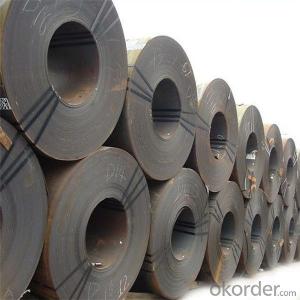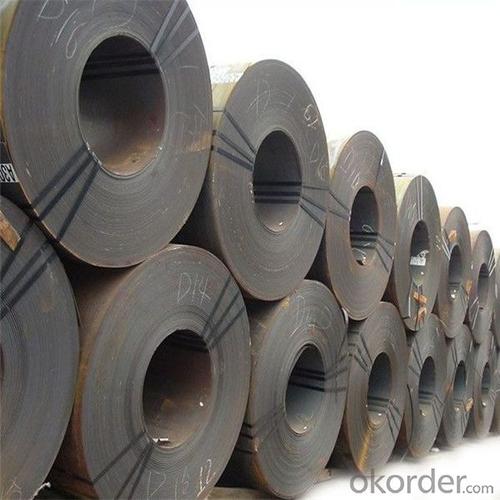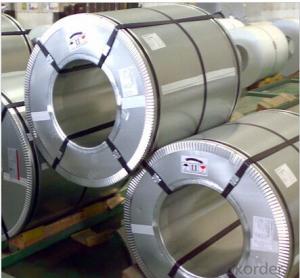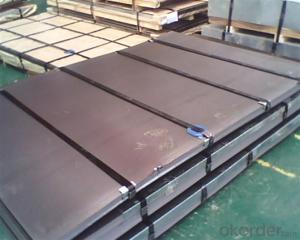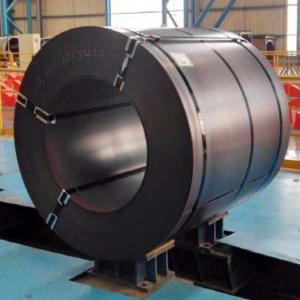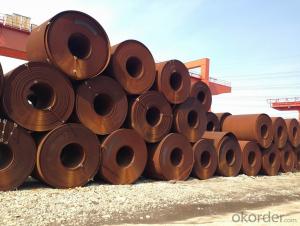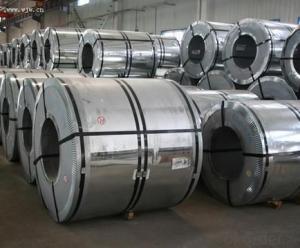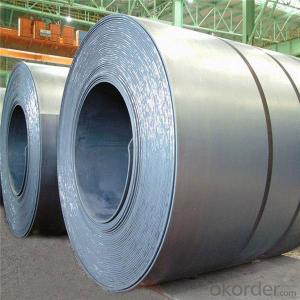Steel sheet in coil hot rolled JIS/ASTM/SAE/EN
- Loading Port:
- Shanghai
- Payment Terms:
- TT OR LC
- Min Order Qty:
- 100 m.t.
- Supply Capability:
- 13497 m.t./month
OKorder Service Pledge
OKorder Financial Service
You Might Also Like
Specification
Hot Rolled SteelA rolling process at temperatures over 1,000 degrees Fahrenheit is use to create
hot rolled steel. Steel products in Massachusetts that have been processed in this manner will
have a blue-gray finish that feels rough to the touch.
Hot rolled steel actually reconfigures itself during the cooling process, giving the finished product
looser tolerances than the original material and when compared to cold rolled steel products. Hot
rolled steel is more malleable, allowing it to be forced into a variety of different shapes.
Our Advantage: High quality steel products from 1 class mills in
Reasonable price
Professionalism of the products
On-time delivery
Complete documents and certificates
Sincere service to meet our clients' requirements
Standard and Grade :
Hot rolled steel coils | ||||
JIS | ASTM | SAE | EN | |
Commercial quality | G3131 SPHC | A569 A635 A659 A1011 CS Type A,B,C | 1006~1025 |
10111 DD11 |
Drawing quality | G3131 SPHD | 1006~1010 | 10111 DD12 | |
Deep drawing quality | G3131 SPHE | A622 A1011 DS Type A,B | 1006~1010 | 10111 DD13 DD14 |
General structure (T.S.<490N/MM2) | G3101 SS330 SS440 G3106 SM400A G3132 SPHT1 SPTT2 SPHT3 | A36 A283 GR.C A570 GR.30~40 A1001 SS GR.30~40 |
1010~1025 | |
General structure (T.S.≥490N/MM2) | G3101 SS490 G3106 SM490A SM490YA | A570 GR.45~50 A607 GR.45~70 A1011 SS GR.45,50 |
J1392 050X | |
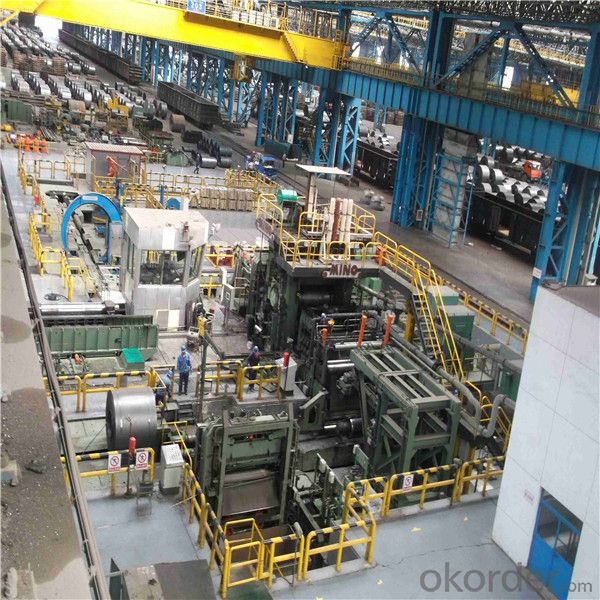
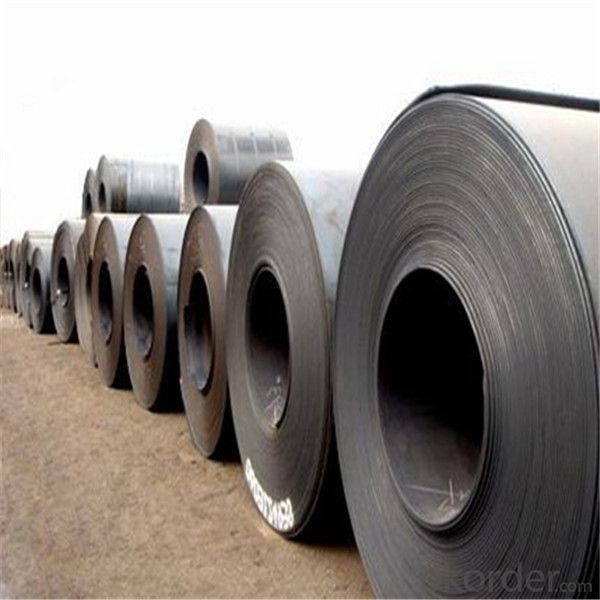
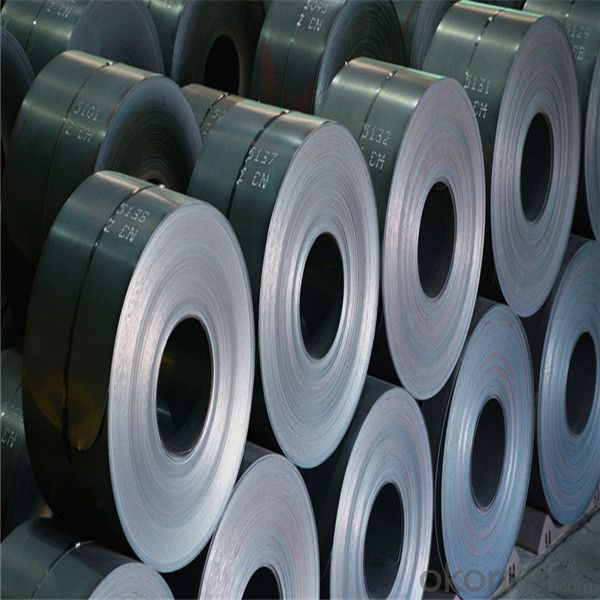
Packing:
Packaging Detail | The packing of coil consists of anti-damp paper ,PVC film ,hardboard paper , steel box , strapped with steel strips, fitted with locks and edge protectors and guarantees the optimal condition of the delivered goods. Each coil can be additionally fitted with wooden/steel skids(eye of the side) or wooden pallets(eye of the sky) |
Delivery Time | within 30 days of receipt of LC original or prepayment |
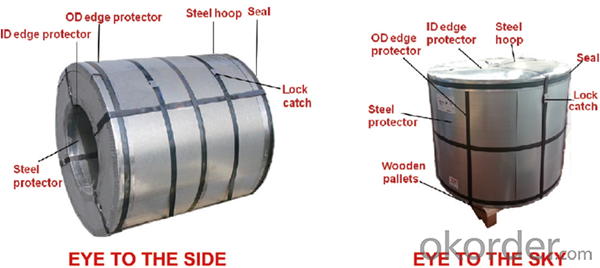
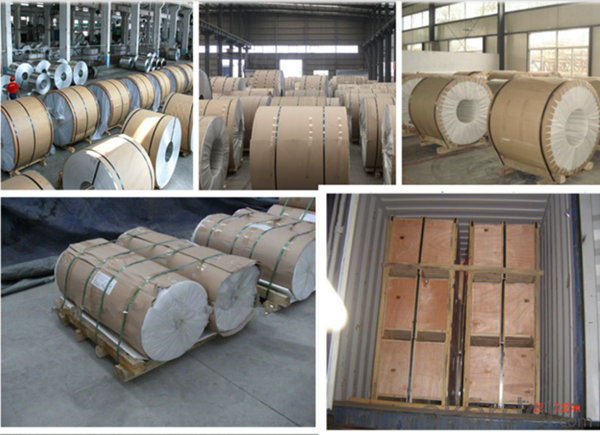
Our Services
MOQ | FCL, 25 metric tons per 20GP, can be assorted with different sizes. |
LCL for trial order is acceptable. | |
Price Term | EX-WORK, FOB China Port, CNF, CIF |
Payment | T/T, 30% advanced payment before production and balance before shipment; OR Irrevocable L/C at sight. |
Delivery Time | within 30 days of receipt of LC original or prepayment |
(1) We cooperate with famousfactories with advanced equipment and well trained workers.
(2) We can provide factory price with trading company service.
(3) We continuously work on the improvement of our processes, guaranteeing
consistently high standards of quality to keep none compensation.
(4) We guarantee 24 hours response and 48 hours solution providing service.
(5) We accept small order quantity before formal cooperation.
(6) We deliver the agreed quality at the agreed time, reacting to changes in
customer wishes in a flexible way.
(7) Due to our volume and selling power, we have excellent freight rates with
shipping lines.
(8) We strive to always be fair and honest in our dealings with customers.
(9) We strive to work together with customers to achieve much more than we
can achieve alone.
(10) Through our passion and commitment we aim to be a market leader in all
our key markets. To maintain our position as market leader we must continue to
add value in all that we do.
FAQ:
1. How to guarantee the quality of the products?
We have established the international advanced quality management system,every link from raw
material to final product we have strict quality test;We resolutely put an end to unqualified products
flowing into the market. At the same time, we will provide necessary follow-up service assurance.
2. How long can we receive the product after purchase?
Usually within thirty working days after receiving buyer’s advance payment or LC. We will arrange the factory manufacturing as soon as possible. The cargo readiness usually takes 15-25 days, but the shipment will depend on the vessel situation.
- Q: What is the maximum thickness of steel coils?
- The maximum thickness of steel coils can vary depending on various factors such as the type of steel, manufacturing process, and industry requirements. However, in general, steel coils can range from a few millimeters to several inches in thickness.
- Q: What is the cost of a steel coil?
- The cost of a steel coil can vary depending on several factors such as the type of steel, size, weight, and market conditions. It is best to contact a steel supplier or manufacturer for an accurate and up-to-date price quote.
- Q: Can steel coils be used in the manufacturing of appliances?
- Appliances can indeed utilize steel coils for their production. They are frequently employed as the principal raw material in the manufacturing of various appliances, including refrigerators, stoves, dishwashers, and washing machines. To meet appliance specifications, these steel coils are typically processed and molded into specific parts like panels, frames, or doors. The utilization of steel coils in appliance manufacturing provides several benefits, such as robustness, longevity, and resistance against corrosion. Moreover, steel coils can be effortlessly fabricated and manipulated to accommodate the distinct design needs of different appliances, making them a versatile and frequently employed material within the industry.
- Q: What are the advantages of using steel coils in construction?
- There are several advantages of using steel coils in construction. Firstly, steel coils offer exceptional strength and durability, making them suitable for supporting heavy loads and withstanding harsh environmental conditions. Additionally, steel coils provide a high degree of flexibility, allowing for customization and versatility in construction projects. Moreover, steel coils are fire-resistant and non-combustible, enhancing the safety of structures. Furthermore, they have excellent corrosion resistance, requiring minimal maintenance and ensuring long-term structural integrity. Lastly, steel coils are readily available and cost-effective, making them a preferred choice in the construction industry.
- Q: How are steel coils used in the production of metal fencing?
- Steel coils are used in the production of metal fencing as they serve as the raw material for manufacturing the fence panels and posts. The steel coils are typically flattened, cut, and shaped into various components, such as wires or sheets, which are then assembled to create the final fencing product. The durability and strength of steel make it an ideal material for fencing, ensuring the fence's ability to withstand external forces while providing security and boundary demarcation.
- Q: How do steel coils contribute to thermal insulation in buildings?
- Steel coils do not contribute to thermal insulation in buildings. In fact, steel is a good conductor of heat, so it can actually transfer heat rather than insulate against it.
- Q: Steel resist tension. Then why we provide steel in compression zone ?
- There are several reasons to add compression steel. Keep in mind, supported steel (meaning it can't buckle) resists compression as well. Compression steel helps reduce long term deflections. Concrete creeps under sustained loads. Steel lessens the compression, meaning less sustained compressive stress to cause creep deflection. It makes members more ductile. Since the steel takes some of the compressive stress, the compression block depth is reduced, increasing the strain in the tension steel at failure, resulting in more ductile behavior (the moment at first yield remains largely the same with compression steel added, but the increase in capacity after yield is significant). Compression steel insures that the tension steel yields before the concrete crushes, meaning it helps change the failure mode to tension controlled. It makes beams easier to construct. With bars in the top and bottom, you have longitudinal reinforcement in all 4 corners of the shear stirrups to keep them in place when pouring the concrete. Also, for continuous members, its often easier to run your negative moment steel the full length of the beam rather than trying to cut it off in the positive moment regions. Serviceability concerns. You're going to end up putting steel in that region anyway to for temperature and shrinkage.
- Q: What is the purpose of coating steel coils?
- The purpose of coating steel coils is to provide protection against corrosion, enhance durability, and improve the aesthetic appearance of the steel. Coatings create a barrier between the steel surface and the environment, preventing moisture, chemicals, and other corrosive elements from reaching the metal. Additionally, coatings can offer additional benefits such as heat resistance, UV protection, and improved paint adhesion, making the steel coils suitable for a wide range of applications in various industries.
- Q: How are steel coils used in the production of storage systems?
- Steel coils are used in the production of storage systems as they are rolled into sheets and then formed into various components such as shelves, frames, and brackets. These components are then assembled to create sturdy and durable storage systems that can hold and organize various items efficiently.
- Q: What are the safety precautions when handling steel coils?
- When handling steel coils, it is important to follow certain safety precautions. First, workers should wear appropriate personal protective equipment (PPE) such as gloves, safety goggles, and steel-toed boots to protect against cuts, impacts, and eye injuries. Additionally, workers should receive proper training on safe lifting techniques to prevent strains and back injuries. It is crucial to use appropriate lifting equipment such as cranes or forklifts to avoid manual handling injuries. Adequate clearance should be maintained between coils and other objects to prevent accidents or damage. Lastly, workers should be aware of the weight and dimensions of the coils to ensure they are properly secured during transportation and storage.
Send your message to us
Steel sheet in coil hot rolled JIS/ASTM/SAE/EN
- Loading Port:
- Shanghai
- Payment Terms:
- TT OR LC
- Min Order Qty:
- 100 m.t.
- Supply Capability:
- 13497 m.t./month
OKorder Service Pledge
OKorder Financial Service
Similar products
Hot products
Hot Searches
Related keywords
